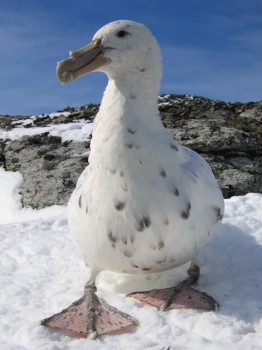Uwe Horst Schulz (Laboratório de Ecologia de Peixes, Universidade do Vale do Rio dos Sinos, São Leopoldo, Rio Grande do Sul, Brazil) and colleagues have published in the Japanese journal Zoological Science on gender differences during breeding by Southern Giant Petrels Macronectes giganteus.
The paper’s abstract follows:
“Differences in nest attendance between genders in seabirds may be related to morphological differences. Southern giant petrel is a dimorphic species with gender-specific foraging behavior. The objective of this study was to investigate sex-related differences in nest attendance during the breeding period of southern giant petrels by presence/absence patterns of both sexes during incubation and compare use of the colony after nest failure. Fourteen birds were tagged with digitally coded radio-transmitters in a colony at Elephant Island, Antarctica, in the beginning of 2009/2010 breeding season. Females were present during 18 periods (min. 3 days, max. 9 days) and males only in five periods (min. 2 days, max. 13 days). The difference in mean number of radio signals per day between females (4330; s.e. 313.5) and males (2691; s.e. 248.6) was highly significant (t = 4.3; d.f. = 199; P < 0.001; Fig. 4). As consequence of the severe weather conditions that year, all tagged birds failed to reproduce. After abandonment of the nests, the presence of both genders decreased drastically, although the tagged individuals stayed in the area. Under severe weather conditions female Southern Giant Petrels continue breeding while males abandon the nest earlier.”

A Southern Giant Petrel in Antarctica, photograph by Michael Dunn
Reference:
Schulz, U.H., Krüger, L. & Petry, M.V. 2014. Southern Giant Petrel Macronectes giganteus nest attendance patterns under extreme weather conditions. Zoological Science: 501-506.
John Cooper, ACAP Information Officer, 12 August 2014

 English
English  Français
Français  Español
Español